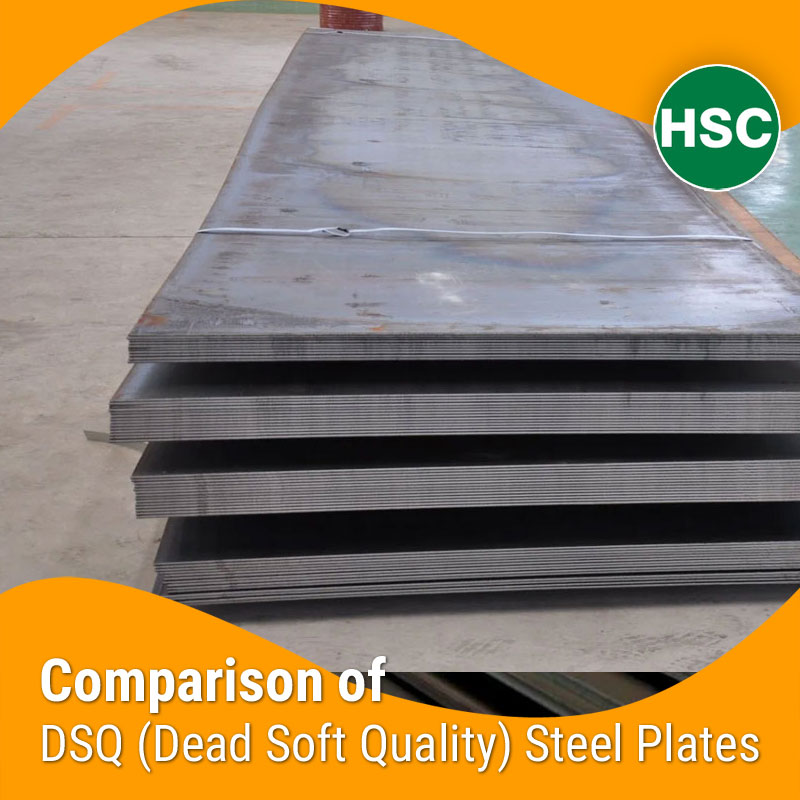What is the Difference Between DSQ and IS 2062 Plates?
DSQ (Dead Soft Quality) Plates and IS 2062 Structural Plates serve very different industrial purposes. While both fall under the carbon steel category, their mechanical properties, forming capabilities, and end-use applications vary greatly.
- DSQ Plates are highly ductile, dead soft, and easily formable, making them ideal for tank fabrication, acid storage, and galvanizing plants.
- IS 2062 Plates are structural-grade steel plates used in construction, frames, and heavy machinery—designed for strength, not flexibility.
If you’re confused between the two, the key lies in their formability vs. strength. One is meant to bend without cracking (DSQ), while the other is built to support load (IS 2062).
Applications of DSQ vs IS 2062 in Industry
| Application | DSQ Plate | IS 2062 Plate |
|---|---|---|
| Tank Manufacturing | ✅ Ideal – soft and bendable | ❌ May crack during forming |
| Galvanizing & Pickling Plants | ✅ Commonly used | ❌ Not preferred |
| Pressure Vessel Usage | ⚠️ Limited due to low tensile | ✅ Widely used with certifications |
| General Structural Fabrication | ❌ Not suitable | ✅ Designed for structural load |
| Acid & Chemical Storage | ✅ Excellent corrosion resistance | ❌ Low ductility |
Mechanical Properties Compared
| Property | DSQ Plate | IS 2062 (E250 / E350) |
|---|---|---|
| Yield Strength | 180 – 240 MPa (approx.) | 250 – 450 MPa (based on grade) |
| Elongation % | 30% – 38% | 20% – 26% |
| Toughness (at low temp) | Moderate | Moderate to High (based on grade) |
| Weldability | Good | Good |
| Bending/Formability | Excellent | Moderate |
Chemical Composition Snapshot
| Element | DSQ Plate (Typical) | IS 2062 Grade B / E250 |
|---|---|---|
| Carbon (C) | 0.15% max | 0.23% max |
| Manganese (Mn) | 0.40 – 0.70% | 1.50% max |
| Sulphur (S) | 0.05% max | 0.045% max |
| Phosphorus (P) | 0.05% max | 0.045% max |
Which Standard Do These Belong To?
- DSQ Plates typically follow IS:8917:1978, a special Indian standard for forming-grade steel
- IS 2062 Plates follow IS 2062:2011 for structural steel with yield-based grading (E250, E350, E410, etc.)
Thickness and Size Range
- DSQ Plates: Available from 3mm to 100mm; cut-to-size options for curved tanks and formed vessels.
- IS 2062 Plates: Range from 5mm to 150mm; offered in standard widths like 1250mm, 1500mm, and 2500mm.
How to Choose Between DSQ and IS 2062?
| If You Need… | Choose This |
|---|---|
| High ductility and easy formability | ✅ DSQ |
| High strength for load-bearing | ✅ IS 2062 |
| Tank or vessel manufacturing | ✅ DSQ |
| Bridge, structure, or beam fabrication | ✅ IS 2062 |
Exact values depend on plate thickness and production batch.
Why HINDUSTAN STEEL CORPORATION?
We offer both DSQ Plates and IS 2062 Grades (E250/E350) with:
- BIS certification & MTCs
- Cut-to-size supply
- Full export documentation
- Dedicated technical guidance
Need help choosing the right grade? Our engineers help buyers select based on application stress, bend radius, and chemical resistance.
Export Destinations
We export DSQ and IS 2062 plates to:
- UAE, Saudi Arabia, Oman – for tanks & plants
- South Africa, Kenya, Egypt – for galvanizing & pickling
- Vietnam, Malaysia, Bangladesh – for fabrication and projects
Buyer Checklist – Ask These Before Ordering
- Do you need high ductility or high strength?
- Will the plate be bent, rolled, or press-formed?
- Will the plate hold liquids (acid/chemical/water)?
- Do you need IS certification or project approval?
Certification & Quality Assurance
- DSQ Plates: As per IS 8917:1978, with mill test reports
- IS 2062 Plates: BIS, IBR, and PED approved grades available
FAQs DSQ vs IS 2062 – What’s the Difference?
What is the main difference between DSQ and IS 2062 plates?
DSQ is for formability and soft bending; IS 2062 is for structural strength.
Can DSQ plates be used in structural work?
Not recommended. DSQ lacks high yield strength for structural use.
Which is better for tank fabrication – DSQ or IS 2062?
DSQ is far better due to its dead soft quality and crack-free bending.
Are DSQ plates IS certified?
Yes, DSQ follows IS 8917:1978 standards in India.
What is the yield strength of IS 2062 E250 vs DSQ?
IS 2062 E250 = ~250 MPa; DSQ = ~180–240 MPa (approx.)
Can I order both DSQ and IS 2062 from Hindustan Steel?
Yes. We stock and supply both grades with proper documentation.
Which steel plate is best for acid-resistant tanks?
DSQ plates are preferred due to cleaner chemistry and better formability.
Do DSQ plates support welding?
Yes. DSQ can be gas, arc, or TIG welded for tank fabrication
Is IS 2062 cheaper than DSQ?
It depends on thickness, grade, and size—but DSQ may cost more due to specialized use.
Can I get cut-to-size DSQ and IS 2062 plates?
Yes. We offer full CNC cutting and edge preparation services.
Contact Hindustan Steel Corporation for custom sizes, export pricing, or technical comparison help.

